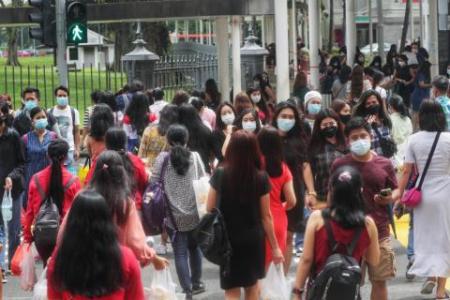S'poreans take new Covid-19 variant in their stride
A day after product marketeer Mervelle Lek booked a flight to London, the World Health Organisation (WHO) declared the mutated Covid-19 strain Omicron as a "variant of concern".
Britain subsequently tightened rules to require arrivals from all countries to self-isolate while waiting for test results, and to mandate masks in retail settings.
Ms Lek, 27, went ahead with her week-long trip to London from Nov 30 to Dec 6. "There were definitely some fears because Omicron was so new and no one knew anything about it," she said. "But they didn't say it was deadlier so I didn't want to prematurely freak out.
"I decided I would still proceed with my plans, but just be extra careful and keep a close watch on the news as we learn more about the variant."
Omicron has been quick to spread to nearly 80 countries around the world, and while not much has changed for most Singaporeans who spoke to Insight, they are abiding by existing Covid-19 protocols.
Some are also taking extra steps like testing themselves regularly, even when not mandated.
As perceived risks of Covid-19 fall, with many having a better understanding of the disease and widespread vaccination; as well as personal experiences with the virus - where Singaporeans are much more likely to know cases of people who have survived Covid-19 with mild symptoms - there will naturally be less public support for heavy restrictions, said economist Walter Theseira from the Singapore University of Social Sciences.
"At the start of the pandemic, people voluntarily stopped going out and gathering in groups, even before the Government imposed restrictions, as many were worried back then that catching Covid-19 was a death sentence."
The situation is different today, judging by the crowds in malls and elsewhere, he said. "Many simply follow the necessary safe management measures, but do not worry too much beyond that," he added.
Associate Professor Theseira said that he too, would not be taking further action beyond what is directed by Government - nor would his elderly mother.
"It is true that she is vulnerable, but she is vaccinated, has received her booster, and her mental and social health depends strongly on her being able to live her life as she wishes, including regularly going to the market, going out for meals, and so on," he explained.
Others like Professor Dale Fisher, a senior consultant at the National University Hospital's Division of Infectious Diseases - who will return from Geneva over the weekend - said nothing much has changed either.
"I am not worried because I am triply-vaccinated and I have faith in my behaviours to avoid the disease and faith in the vaccine to prevent severe disease should I get Covid-19," he added.
There is no need to take special precautions with Omicron, said Prof Fisher, adding that it is the same drill: vaccinate and practice safe distancing, mask wearing and proper personal hygiene.
During a Tuesday press conference on Singapore's preparations for Omicron, Finance Minister Lawrence Wong said it was important for people to keep exercising personal responsibility, given that Singapore is now experiencing "perhaps the calm before the next storm". This means complying with safe management measures and getting into the habit of self-testing.
Technology professional Lim Wui Liang, 42, agreed with the need for regular testing, saying he has done so a few times after getting a runny nose, "just to be sure".
He cancelled a trip to Sydney with his wife and son after Australia imposed a 72-hour quarantine on all arrivals. "We decided it wasn't worth it, spending three days cooped up in a hotel room," said Mr Lim.
Research analyst Daniel Lim, 28, has gone to the extent of asking visitors to his house to take a quick antigen rapid test (ART) before coming over. He added that Omicron has also slightly deterred him from visiting crowded places, while encouraging him to continue taking personal precautions seriously.
But Mr Daniel Lim expressed discomfort with what he felt were "ever expanding" vaccination-differentiated measures (VDM).
On Tuesday, Health Minister Ong Ye Kung announced that one's status as "fully vaccinated" after taking two mRNA jabs - or three Sinovac or Sinopharm doses - would lapse unless a booster shot is also taken, within a period still being mulled over. VDM will also be expanded to more places from Feb 1.
"Covid is already making us live with various constraints," said Mr Daniel Lim, who has received two Sinopharm shots and is going for a third next month.
Associate research fellow Tan Ming Hui from the policy studies group at Nanyang Technological University's S. Rajaratnam School of International Studies (RSIS) pointed to widespread pandemic fatigue.
"It is understandable that the general public might feel frustrated with prolonged restrictions, and may even disengage themselves from public health messaging," she said. "It is important for Singapore to continue with consistent and clear communications about the risk of new variants and why safe management measures remain necessary, while also acknowledging the people's hardships and anxiety about an uncertain future."
Get The New Paper on your phone with the free TNP app. Download from the Apple App Store or Google Play Store now


